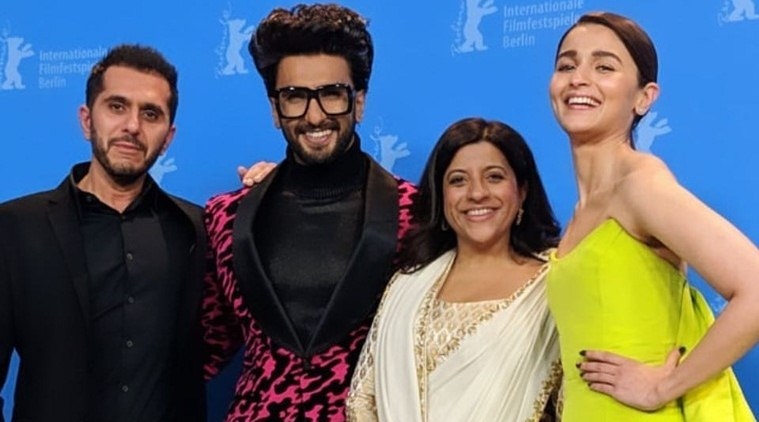
I’m at that point at the Berlinale where after a series of bleak, dark films about the human condition, a blast of Bollywood is warming. The screaming fans at the first public screening of Gully Boy are treated not just to the film, but lead actor Ranveer Singh whooping it up on stage, with everyone else in the cast-and-crew line up, including director Zoya Akhtar, producer Ritesh Sidhawani, and lead actress Alia Bhatt in a long floaty lime green dress, looking on.
When Singh lets it rip, he does it like no one’s looking. All that manic energy floats across the Friedrichstadt-Palast theatre, filled to the brim with mostly young third generation ‘desi’ diaspora viewers, some of whom speak no Hindi or Urdu, only German, all on their feet, nodding and yelling, rapping along.
Also read | Express at Berlinale 2019 – Day 3
People who were in the same theatre in 2011 when it screened Shah Rukh Khan’s Don 2 say that level of noise is as deafening. No one can dislodge SRK from our hearts, says die-hard German Bollywood fan Anja, who is hanging around the Regent Hotel where the cast of Gully Boy is staying. But she has turned up to catch a glimpse of the ‘new’ hero, and goes away happy when Singh, Bhatt, Akhtar and Sidhwani pose for selfies before they chat with us, the visiting Indian press.
Akhtar was blown away after her first brush with Indian rap. It was a track called “Aafat” by Naved Sheikh better known as Naezy (Naezy and Divine are credited right up top in Gully Boy). Till then she had had no idea of ‘this underground space’, but then, she says, ‘I met him, and told him how much I loved his crazy flow, it started from there, and now here we are’.
Singh says hip hop grabbed him at a really young age. A visiting cousin from the US used to bring back tapes (cassettes) and ‘we would tear off the inlay and learn the verses’ from the work of artists like Vanilla Ice, Will Smith and MC Hammer. ‘I didn’t understand the themes too much, but yes I understood that it was a very authentic expression, I could sense real anger, real angst’.
‘My father and brother are dialogue writers’ says Akhtar,’ but they were sharp enough to know that this was not their space’. The search for ‘authenticity’ led Akhtar to Vijay Maurya. ‘Anurag Kashyap recommended him, and I owe Anurag one’, she says. ‘Vijay wrote the dialogues and he is in-cred-i-ble (she emphasizes each syllable), but even he is smart enough to know that he isn’t 18-20 any more, and that the slang has changed. Four young rappers were brought on to make sure that the film sounds real.
Also read | My DNA is Simmba, not Gully Boy: Ranveer Singh
I ask Alia Bhatt about how she learnt the body language of a girl who lives on the wrong side of the tracks. ‘Safeena (her character) is so well written, that I had to just follow the writing’. Is she now the pivot around which some of the sharper scripts in Bollywood are being written? (Bhatt’s Raazi in 2018 crashed the 100 crore barrier). It is a tricky question, but she handles it smartly: ‘I think that’s giving myself too much importance, but yeah you can say I’m getting to play a lot of strong female characters, because we are getting good writing finally’.
Is that really the case, I ask Ritesh Sidhwani whose production house has done such films as Dil Chahta Hai, Rock On, Don, Dil Dhadakne Do among others. Every time a well-written film makes money, there are rah-rahs, and then along comes a film with zero writing and it makes those crores. How does that compute?
If there is no story, none of us have a job, says Sidhwani. And now the writers’ job is even more important because that theatrical window is not the only one. The streaming platforms have the potential to take it to 145 countries, and the stories have to be relatable. ‘I would say that in India the ‘mainstream’ is being re-defined with every big hit.’
So is Bollywood finally changing? Is this the best time to be a filmmaker? Akhtar’s answer is prompt. ‘Everything is changing, the world is changing, so is the film industry. As it must. I’ve grown up in a very commercial Hindi film home, and I have been exposed all my life to world cinema which would never be considered mainstream. I feel like I’m a mish-mash of these two things. And I feel like my time is now.’
I can’t resist the closing line. ‘So, apna time aa gaya’?
Oh yes, she grins.